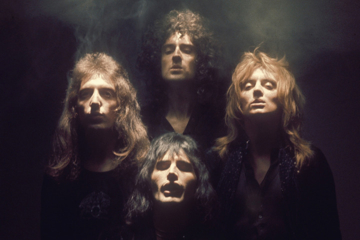Film Carew
Film Carew vs Declaration Of War, The Innkeepers, Woody Allen: A Documentary, and Eames: The Architect and The Painter
It sounds like the recipe for some horrendous awards-show-chaser: a based-on-a-true-story story about a hot young couple whose fanciful, fun-lovin' world is rocked when their 18-month-old son is diagnosed with a brain tumour. Oh, and, the true-story comes from the lives of co-writers/co-stars Valérie Donzelli and Jérémie Elkaïm, who shot the film in the same hospitals and with many of the same doctors that they visited in their descent into parental hell. So, um, wait, how did the Oscars turn down Declaration Of War? Perhaps its Best Foreign Film Oscar snubbin' —it was the French submission— was due to the fact that its lurid human-interest back-story wasn't delivered with enough middle-brow melodrama and emotional manipulation. Instead, Donzelli —who directed the picture— turns her true-life tale into a whimsical pirouette through musical numbers, colour-saturated montages, magic-realist flourishes, ever-changing narrators, storytelling gimmicks, and cold moments of unspared medical mumbo-jumbo. Given I'll, at least, forever associate Donzelli as the eponymous lead from Sandrine Veysset's crushing Martha... Martha, it's interesting to see her own auteurist aesthetic as so wild, colourful, cacophonous; so hurtling-in-all-directions-at-once. In one symbolic scene, as her son enters an MRI machine, and frenetic electronic music fries the soundtrack, Donzelli starts running through the hospital. It doesn't really make much human-behaviour sense nor add anything great to the narrative, but it's this intense shock of sudden, frenetic, nearly-kinetic energy; a great music-video instant of pounding life but essential meaninglessness. The meaning Donzelli and Elkaïm see —in this and the film-as-whole— is their declared war, which is on complacency, the meekness of a generation of 30-somethings whose cosy lives of sweet plenty and hyper-capitalist conditioning have left them effectively inured to life. But the flick's title also skirts too close to the troubled language of the cancer 'battle', in which 'war' is declared on an invasive species that is anything but; an unfortunate semantic association given Declaration Of War has a clear-eyed, clear-minded relationship to —and understanding of— cancer that is not informed by American marketing platitudes, but by having lived through it.
It'll be jarring for local viewers —at a time in which she's become some televisual equivalent to Lana Del Rey— to see Lena Dunham pop up, in a tiny role, as the barista at the local caf in The Innkeepers. Given the deluge of tedious internet commentary devoted to Dunham's skin colour, parents, attractiveness, etc.etc. without fucking end, her appearance here feels like revelation followed by anticlimax; a famous face and a loaded exchange giving rise to, well, nothing. But it's telling in all manner of ways: its anticlimax symbolising an opening hour in which The Innkeepers happily subverts all expectations of those sitting down for a horror-movie, and Dunham's appearance —like Greta Gerwig's in The House Of The Devil— making tangible the connection between Ti West's brand of downplayed retro-horror and the mumblecore movement. West's latest feature is an amiable gab-fest where comparisons to Clerks make more sense than those to The Shining, in which Sara Paxton and Pat Healy are a pair of hotel staffers working the final night-shift at the soon-to-be-closed, dilapidated ol' Yankee Peddler. They sit around talking shit, crackin' wise, pulling minor pranks, and generally goofing off, but there's a constant return to ghost stories, to the supernatural, to the myth that the hotel's haunted. Each is a tantalising suggestion that stokes anticipation, but West delights in delivering dead-end after dead-end: every jump moment a red herring, every piece of plot a narrative cul-de-sac, signposted signals of imminent terror pointing nowhere, the promise of the looming mood finally flowering into fright remaining an eternal tease. Fans of modern horror —of slashers, reboots, torture porn et al.— will find it somewhere between tedious and annoying; and, in fact, at times it appears as if West is delighting in such, hoping to piss off genre trolls. His film constantly subverts expectations, in a weirdly passive-aggressive way; hell, it's not even a horror-movie, just a minor ghost story in which mood trumps action, all dialogue is incidental, and the ending is cold-hearted and cruel with nary a note of crowdpleasin' irony.
Woody Allen: A Documentary was made —by Curb Your Enthusiasm stooge Robert B. Weide— for PBS TV's eternal 'American Masters' series, and it never goes beyond its televisual brief: this is Woodsy 101. Here, Weide goes for the straight biographical approach: recounting the life of history's most beloved Neurotic Jew chronologically, from childhood frolics, to early showbiz days, and then taking on his 'classic' (ie: pre-'90s) era on a case-by-case basis. If you've never seen an Allen film, then, oh, wait, shit, I totally envy you!: he's one of the most overrated directors ever; a zany populist whose few artistic 'peaks' are works of screenplay shtick and filmmaking mediocrity. But, also, if you've never seen an Allen film, then this 101 may be a little too reverent, and if you're an Allen fan, it'll seem way too elementary; this is middleground, middlebrow work. And it's certainly not cinematic; it's a career survey that doesn't dare stand on its own two feet. The only bit in the Documentary that breaks shop-talk ranks is the thankfully-not-dodged discussion of that hilarious time when the crazy ol' Woodster hilariously shacked up with the mother-of-his-children's 35-years-younger adopted daughter.
The Eames in Eames: The Architect And The Painter are plural: Charles and Ray Eames, the husband/wife partnership who collaborated on furniture, architecture, installation, film, advertising, etc.; become America's high king and queen of modernist design. Jason Cohn and Bill Jersey's chronicle of their shared career surveys their work with a general patter of tropes and platitudes: hyperbole-prone celebrity narration (James Franco!), endless talking heads pontificating, archival footage, and Eames films cut up into what feels like a PR piece for their legacy.
Don't miss a beat with our FREE daily newsletter







